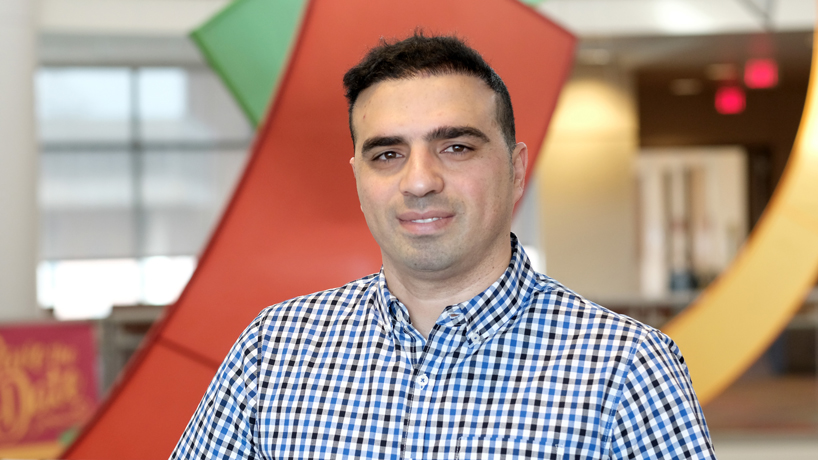
Ehsan Davarzany, a native of Iran, earned his master’s degree in economics from UMSL six years after immigrating to the United States after winning the Diversity Visa Lottery. (Photo by August Jennewein)
The realization hit Ehsan Davarzany as he started to pick up his backpack full of economics textbooks and associated notes on the way out of his house last Thursday morning.
“I don’t need that,” he thought to himself.
The day before Davarzany had completed the final exam in “ECON 4040: Booms and Busts in the Economy: Data and Theory.” It was the last assignment in the last course he needed to earn his master’s degree in economics from the University of Missouri–St. Louis.
That marked the culmination of a six-year journey that brought him from his native Iran – a winner of the United States’ Diversity Visa Lottery – to St. Louis to pursue his education, overcoming a language barrier and financial challenges along the way.
“I feel really good,” Davarzany said late last week while sitting in the rotunda of the Millennium Student Center. “I had a plan for six years, and I’m done right now.”
Davarzany still owes one of his friends in Iran for setting that plan in motion. It was that friend who encouraged him to fill out his application for what is more commonly and casually referred to as the Green Card Lottery. Before that, Davarzany hadn’t been aware that every year the U.S. Department of State awards 50,000 permanent residency visas to foreign nationals of countries with low rates of immigration to the United States through a random drawing with the intention of diversifying the U.S. immigrant population.
With tens of millions applying from around the world each year, the likelihood of winning is beyond miniscule. But when Davarzany’s name was pulled, his family and friends quickly convinced him he couldn’t pass up the opportunity.
The then-27-year-old left behind a job as a project manager at his father’s welding machine manufacturer in his hometown of Shiraz, a city of about 1.5 million in the south-central part of the country, to come to the United States in 2013.
A friend of a friend who’d settled in St. Louis convinced him to start out in the Gateway City, rather than on one of the coasts, where the cost of living is heightened.
“The first six months was hell,” Davarzany said. “I didn’t know how to make conversation, how to talk to people.”
Davarzany had learned some English grammar growing up, but it didn’t do him much good when it came to speaking with people in a different dialect with an unfamiliar accent.
He recalled visiting an AT&T store to get a new SIM card for his phone. A saleswoman talked to him for nearly 30 minutes, but he couldn’t understand anything she was trying to tell him.
There were times early on when he considered returning home, but he persisted.
“Every time I was talking to my mother, she just kept me here,” Davarzany said. “She made me hope.”
He started to feel optimistic all on his own as his language skills slowly but surely started to improve and he made connections, including an older Persian man he worked with at a golf course.
Davarzany, who’d earned a bachelor’s degree in agriculture from Azad University, had been living in the United States almost a year when he came to UMSL to explore getting his master’s. He met with an advisor who encouraged him to enroll in the ESL Program at St. Louis Community College–Meramec before pursuing his graduate degree.
He took that advice and set off working toward his ESL certificate and a certificate in avionics, all while holding down two jobs to make ends meet.
After a year and half, he earned both certificates, landed a better paying position as an apprentice electrician at Birkel Electric and resumed his pursuit of his master’s.
Davarzany inquired about programs at several local universities, but Professor Anne Winkler, chair of the Department of Economics, and Associate Professor Donald Kridel, the department’s director of graduate studies, persuaded him to choose UMSL because of how welcoming and encouraging they were, despite his still improving English skills.
“The clearest thing I got out of our first conversation was that he wanted an MA in economics,” Winkler said. “It wasn’t just an MA. He was committed to an MA in economics.”
Davarzany still faced his share of challenges over the past three years, many related to communication but also juggling school and a full-time job.
It was a chore writing a series of papers in a second language, and he sometimes had trouble finding the words to stretch out his thoughts.
“All of my professors were really nice and they helped me a lot,” Davarzany said.
Winkler too noticed his growth while teaching him in two courses over the past three years.
“In the latter class, he was volunteering to answer questions and naturally much more participatory,” Winkler said. “He really just transformed in terms of his English language capabilities.”
Now Davarzany, who last year became a naturalized U.S. citizen, is hitting the job market with an eye on landing a position in data analytics. Though he’s exploring options in the St. Louis area, he said he’d like to move south.
He developed a network of friends – other international students, including some medical students at Washington University in St. Louis and Saint Louis University – and several of them have relocated to Dallas for residency or fellowship programs. He’d like to follow them there.
Davarzany developed skills at UMSL, including an understanding of statistical programming languages R and Python and the data analytics tool SAS, that he hopes have him well prepared for whatever position he lands.
“I think he’s really well prepared,” Winkler said. “I think he’s going to be a strong candidate.”














